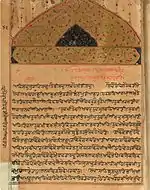Asa di Var
Asa Di Var is a collection of 24 stanzas (pauris) in the Guru Granth Sahib, from ang 462 to ang 475.
| Part of a series on |
| Sikh scriptures |
|---|
 |
| Guru Granth Sahib |
|
| Dasam Granth |
| Sarbloh Granth |
| Varan Bhai Gurdas |
Some people argue that the founder of Sikhism, Guru Nanak Dev, wrote the first 9 stanzas together on one occasion and later wrote 15 more on a different occasion; however, some Sikh scholars believe that the whole vaar was written at the same place as the vaar itself proceeds in a definite uniformity. The whole vaar was compiled by Guru Arjan, the fifth Guru, in 1604 AD.
Overview
When Guru Arjan was compiling the Guru Granth Sahib, he added a few sloks of Guru Nanak and in some cases Guru Angad, the second Guru. These sloks are tied together in a way that they relate to the same theme as highlighted in the pauri. In its present form, the Asa Di Var contains a few more shabads recited by Guru Ram Das, the fourth Sikh Guru.
The Asa Di Var kirtan is recited in the early morning hours in a very melodious way and style as mentioned by Guru Arjan called "Tunde Asraje Ki Dhuni" after the name of the contemporary King Asraj, whose one hand was amputated, thus tunda meaning 'one-hand amputated'. The deeds and the ode of this king was sung by the bards in that typical fashion which then was extremely popular and melodious and was therefore adopted to performing Asa Di Var.
External links
- Guru Gobind Singh Foundation
- In English Text
- Sound Recording by Dya Singh group 2006 with full text, 2CD boxed set
- Asa di Var from Introduction to Sikhism
- Asa di Var in Gurmukhi - Romanized - English (needs Gurmukhi Font)
Audio
- Gurmej Singh (Retired Hazoori Raagi) - Asa De Var
- Amrik Singh Zakhmi - Asa Di War
- Satvinder Singh & Harvinder Singh - Asa Di Waar
- Bakshish Singh (Patiala Wale) - Asa Di War Live at Ross Street Temple
- Surjan Singh Ragi - Asa Di War
- Gurmail Singh (Hazoori Ragi Sri Darbar Sahib Amritsar) - Asa Di War
- ProudtobeSikh
- Sound sample of a Shabad
- Dharam Singh Nihang Singh's exegesis of Aasa Ki Vaar